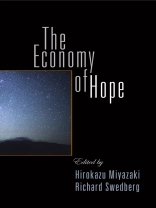Hope is an integral part of social life. Yet, hope has not been studied systematically in the social sciences. Editors Hirokazu Miyazaki and Richard Swedberg have collected essays that investigate hope in a broad range of socioeconomic situations and phenomena across time and space and from a variety of disciplinary vantage points. Contributors survey the resilience of hope, and the methodological implications of studying hope, in such experiences as farm collectivization in mid-twentieth-century communist Romania, changing employment relations under Japan’s neoliberal reform during the first decade of the twenty-first century, the dynamics of innovation and replication in a West African niche economy, and Barack Obama’s 2008 political campaign of hope in the midst of the unfolding global financial crisis.
The Economy of Hope shifts the analytic of anthropological and sociological investigations from knowledge to hope, presents case studies on the loss of collective hope, and concludes by offering techniques for replicating hope. In the hands of Miyazaki and Swedberg and their distinguished contributors, hope becomes not only a method of knowledge but also an essential framework for the sociocultural analysis of economic phenomena.
Contributors: Yuji Genda, Jane Guyer, Hirokazu Miyazaki, Annelise Riles, Richard Swedberg, Katherine Verdery.
Giới thiệu về tác giả
Hirokazu Miyazaki is Director of the Mario Einaudi Center for International Studies, John S. Knight Professor of International Studies, and Professor of Anthropology at Cornell University. He is author of The Method of Hope: Anthropology, Philosophy, and Fijian Knowledge and Arbitraging Japan: Dreams of Capitalism at the End of Finance.Richard Swedberg is Professor of Sociology at Cornell University. He is author and editor of several books, including Principles of Economic Sociology.












